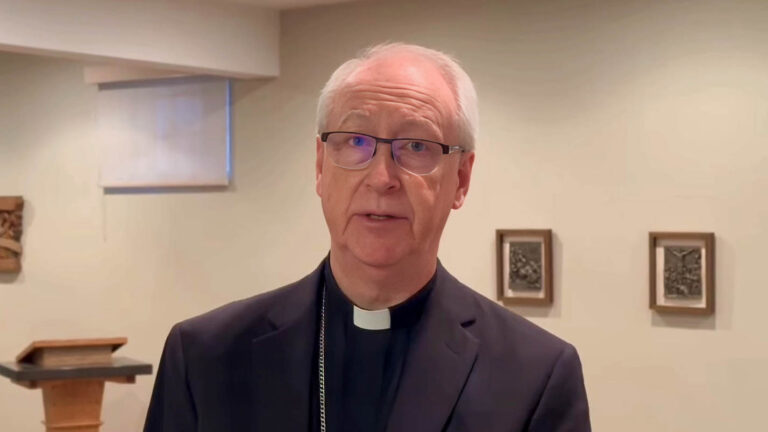Homily
[Wisdom 12:13, 16-19; Psalm 86; Romans 8:26-27; Matthew 13: 24-43]
One year ago, Pope Francis arrived in our city for his visit to the Indigenous Peoples of this land. His arrival coincided with the annual Lac Ste Anne pilgrimage. That was a deliberate choice on the part of the Holy Father, for two reasons. First, he knew that Ste Anne, grandmother of Jesus, is of great importance for the First Nations and Metis people, who hold grandparents and elders in the highest esteem. Second, their appreciation of elders is matched by his own. The need to honour our grandparents and elders, to learn from and cherish them, has been one of the persistent hallmarks of his entire papacy.
In fact, he inaugurated an annual day in their honour. The World Day of Grandparents and the Elderly was first held in 2021; today marks its third occurrence. So, let’s take this particular focus as the context in which we receive and ponder the Word of God we have just heard proclaimed.
There are many reasons we cherish our grandparents and respect the elderly persons we are privileged to know. To lead us into the scriptural texts, I want to highlight one especially important gift that grandparents offer to their families and elderly people to society: perspective. Long life experience endows our elders with a clear perspective on what, for example, is important and what not, or things worth worrying about versus that which is of little consequence. Especially for the young, that perspective can be trusted because the grandparents have already lived through many challenges, and their loving assurance that “things will work out okay” brings real peace of mind and heart.
As we turn to the biblical texts, perspective is precisely what we are given. Here, of course, it is the divine perspective; wisdom that comes from God Himself. God sees everything in its proper light and His perspective, therefore, is thoroughly trustworthy. By heeding God’s Word, we situate our lives within His perspective are thus enabled to reach a proper and peaceful assessment of our life experiences.
Jesus, because he is the Son of God, brings us the divine perspective. Aspects of it emerge as we hear three of his parables. Let’s observe, first of all, that the parables all pertain to the kingdom of God. Each of them begins: “The kingdom of heaven is like ….” Similar to our grandparents and elders, whose experience can help the young sort out priorities, Jesus is teaching us all that our first and fundamental priority is the kingdom of God. This means being concerned, before all else, to submit through repentance and faith to the reign of God’s love in our hearts, and allowing God’s every Word to be life’s compass. From the divine perspective we learn that, when fidelity to God is our first priority, everything in life finds its right place and the parameters for good and right decision-making become clear. In these specific parables, Jesus illustrates this fundamental point by reference to two vexing situations with which the Church has had to grapple in every age, including our own.
First, the parable of the weeds and wheat speaks to the presence of both good and evil in the Church and world and how to respond from the divine perspective. Christians have always struggled with the temptation to enter into rash judgement of the other, to point accusing fingers, and to hurry to exclude. We witness this in our own day. The divine perspective teaches us that judgement belongs to God, who we learn from Wisdom is gentle and patient with the sinner, cares for everyone equally, and is at work within the heart of the wrongdoer to bring about repentance for the sake of salvation. The parable is also addressed to the mixture of good and evil we know exists in each of us. Our hope that God be patient with us should lead us to forbearance with one another.
The second situation addressed by the parables is our concern for quick and great results. The emphasis today upon skill, resources, productivity, achievement, and outcomes can lead us in the Church to worry that we do not have sufficient means to face our enormous challenges, or to become discouraged if our efforts at evangelization, catechesis, and social outreach meet with little or no response. The parables of the mustard seed and yeast offer the divine perspective that God is in charge and at work, that the establishment of His kingdom begins in little, not grandiose ways, and that there will indeed be enormous growth, but in God’s time and in accord with His ways. Mother Teresa captured the divine perspective well when she famously said that God calls us not to be successful but faithful, trusting that He is surely at work in what little we can offer to bring about something wondrous and beyond our imagination.
Nowhere was the divine perspective given greater expression than in the death and resurrection of Jesus. There the world was shown that God’s love conquers all that is evil. That same saving sacrifice of Christ is rendered present here at mass. So, just as children, worried as they can be by many things, are put at ease by the perspective of their grandparents, let us all draw real comfort, in the midst of our manifold concerns, from the divine perspective of the Cross, which speaks to us of the all-powerful love of God. There simply is no reason for fear. All will turn out well.
Most Reverend Richard W. Smith
Saint Joseph Basilica
July 23rd, 2023



